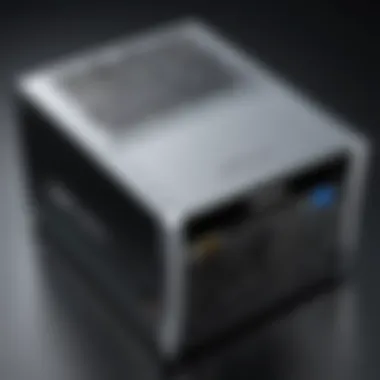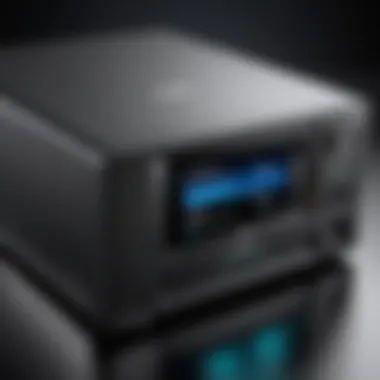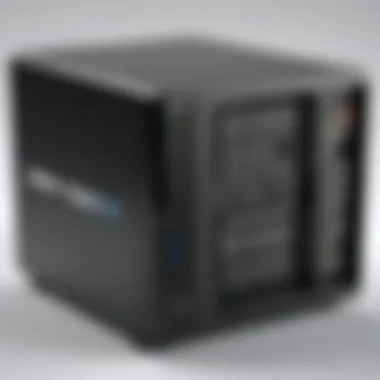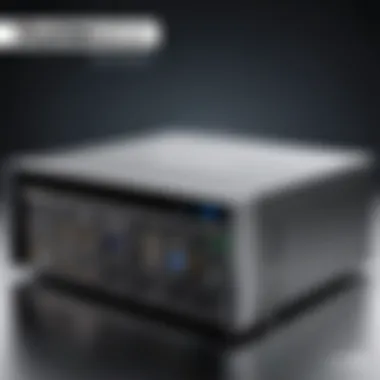A Comprehensive Review of the DiskStation DS218 NAS Solution


Intro
The DiskStation DS218 represents an interesting option within the market of Network Attached Storage. Known for its blend of performance and usability, it's essential to inspect more than just its exterior features. With a focus on its capabilities, the ensuing sections will clarify its benefits and any potential downsides.
Product Overview
Key Features
The DiskStation DS218 is designed to cater to a variety of user needs. Its dual-core processor allows for efficient performance. It supports up to 12 TB of storage per drive bay, offering flexibility in data management. Additionally, the NAS supports a broader ecosystem of applications, enhancing its utility in both home and office environments.
Technical Specifications
It is essential to note some of the specifications that contribute to the DS218's appeal:
- Processor: Intel Celeron J3355 Dual-Core
- Memory: 2 GB DDR3 (expandable up to 6 GB)
- Drive Bays: 2
- Maximum Internal Capacity: 24 TB (12 TB per bay)
- Network Interface: 2 x 1 GbE LAN
This configuration suits various data storage needs, whether for media streaming or file sharing.
Pricing Information
Pricing of the DS218 typically ranges in a competitive segment. As of late 2023, it often retails around $300, depending on sales and availability. This price position makes it an attractive option compared to similar products in the NAS market.
Performance Analysis
Benchmark Results
Performance metrics reveal the strengths of the DS218 in accessing data. Under controlled tests, it achieves impressive read and write speeds, making it suitable for intensive applications. These benchmarks demonstrate its ability to handle multiple users without compromising performance.
Real-World Use Cases
For practical applications, consider scenarios such as:
- Media Streaming: Runs smoothly for 4K streaming applications.
- File Backups: Effective for continuous data backup solutions in small businesses.
- Cloud Synchronization: Facilitates smooth syncing with cloud platforms like Dropbox.
Comparison with Competitors
In comparing the DS218 with other NAS products, like QNAP TS-228 or Synology DS220+, it becomes clear that while each has unique features, the balance of performance and price positions the DS218 well in its niche.
Installation and Setup
Required Tools and Components
Setting up the DS218 requires minimal tools. Users will need:
- Screwdriver: For inserting the drives.
- Drive drives: Recommended NAS-certified disks.
- Ethernet cable: For network connectivity.
Step-by-Step Installation Guide
- Unbox the DS218 and review contents.
- Install drives into bays securely, following the markings.
- Connect the LAN cable to your router.
- Power on the device.
- Follow setup prompts via DiskStation Manager interface.
Troubleshooting Common Issues
Common issues during setup include:
- Network Connection Failures: Verify cables and router settings.
- Drive Recognition Problems: Ensure drives are properly seated.
Pros and Cons
Advantages of the Product
- Performance: Efficient dual-core processor.
- Ease of Use: Intuitive DiskStation Manager software.
- Expandable Memory: Allows for future-proofing.
Disadvantages or Limitations
- Limited RAID Options: Less flexibility in redundancy solutions.
- Basic Hardware Limits: May struggle under maximum load in very large networks.
Who It’s Best Suited For
Ideal for small to medium-sized businesses, tech enthusiasts, and home users who require reliable storage solutions without excessive complexity.
Final Thoughts
Summary of Key Points
The DiskStation DS218 stands as a strong option in the NAS market, combining usability with reliable performance. It provides good technical specifications and flexibility for various use cases.


Recommendations for Potential Buyers
Consider how the DS218 fits into your specific needs. Assess storage capacity, intended use, and existing network setup. If multimedia services or file collaborations are a priority, this model could be a solid choice.
Future of the Technology or Product Line
As technology advances, future iterations are likely to focus on improved processing power and enhanced energy efficiency. The commitment from manufacturers suggests a growing emphasis on integrated cloud services and smarter data management options.
Overall, the DiskStation DS218 provides a competent balance of features for those seeking a robust NAS option.
Prologue to DiskStation DS218
The DiskStation DS218 is a sophisticated Network Attached Storage (NAS) device designed to meet various storage needs. Its relevance in the current tech landscape is significant, as data management becomes crucial for both personal and professional settings. Understanding the functionalities provided by the DS218 is essential for consumers looking to enhance their data storage solutions.
Overview of Network Attached Storage
Network Attached Storage refers to a dedicated file storage system that enables multiple users to access data over a network. Unlike traditional storage options, NAS devices like the DS218 offer centralized data management. Users can easily store, manage, and access files efficiently from any device connected to the network.
Key features of NAS include:
- User Accessibility: Remote access allows users to reach files from various locations without physical proximity to the device.
- Data Redundancy: Most NAS systems, including the DS218, support RAID configurations to ensure data safety and redundancy.
- Scalability: Users can expand storage capacity by adding more drives as data inflow increases.
These features make NAS systems an appealing choice for enterprises, home offices, and consumers with significant data storage needs.
The Role of Synology in the NAS Market
Synology has established itself as a notable player in the NAS market. Known for innovative solutions, Synology offers a range of products that cater to various user requirements. The company emphasizes user-friendly interfaces, exceptional software capabilities, and robust hardware in its devices, allowing for easy integration into home and business environments.
Synology’s commitment to software development is crucial. With its DiskStation Manager (DSM), they provide a powerful and flexible operating system for their NAS devices. This OS enhances the overall user experience by offering various applications for file management, backup solutions, multimedia handling, and more.
Design and Build Quality
Design and build quality are essential factors when evaluating the DiskStation DS218. These elements not only affect the device's aesthetics but also influence its functionality and longevity. A well-constructed NAS can impact user experience significantly, as both physical layout and material choice contribute to performance and accessibility.
Physical Specifications
The DiskStation DS218 has a compact and user-friendly design. It measures 165 x 108 x 232 mm, making it suitable for various environments, whether a home office or a more professional setting. The front panel features LED indicators for power status and network activity, which allows users to monitor performance at a glance.
Constructed with high-quality plastic, the housing offers a blend of sturdiness and lightweight characteristics. It can accommodate up to two 3.5” or 2.5” SATA drives. This flexibility is significant for users looking to tailor their storage solutions. The quiet operation of this unit is notable, thanks to thoughtfully placed vents and a sound-dampening design. Moreover, its safety features include drive locks and a shock-absorbent frame.
Cooling Mechanisms
Effective cooling in a NAS is crucial to ensure reliable performance and prevent overheating. The DiskStation DS218 is designed with such considerations in mind. It features a built-in fan, strategically placed to maximize airflow. This helps maintain optimal operating temperatures even during prolonged use. The fan functions quietly, which is especially important for home environments or quiet office spaces.
The vent placements promote passive cooling, reducing reliance on the active cooling system. Adequate airflow channels are integrated into the design, ensuring that heat dissipates efficiently. Regular monitoring of internal temperatures can be performed through the device’s interface, providing users insight into its operating conditions.
The combination of active and passive cooling mechanisms makes the DS218 an efficient choice for users who demand performance without excessive noise.
In summary, the design and build quality of the DiskStation DS218 reflect a thoughtful integration of form and function. Physical specifications and a robust cooling system not only enhance user experience but also ensure durability and reliability in varied operating conditions.
Hardware Specifications
Understanding the hardware specifications of the DiskStation DS218 is essential, as they represent the foundation upon which its performance is built. These specifications dictate how well the NAS can handle storage tasks, multitasking, and overall efficiency. Knowing its hardware components equips buyers with the insight to evaluate how the device fits their specific needs.
Processor and Memory
The processor and memory in the DiskStation DS218 are pivotal in determining the device's overall performance. The DS218 is powered by a dual-core Intel Celeron processor, which provides sufficient processing power to handle various tasks without bottlenecks. The CPU operates efficiently, allowing for smooth file transfers and application hosting concurrently. Coupled with a 2GB DDR4 memory, the NAS can support multiple users accessing data without significant slowdown, making it a strong choice for both home and small office environments.
Storage Capabilities
Maximum Drive Support
The maximum drive support is a critical aspect of the DS218 as it directly affects the amount of data that can be stored. The device supports up to 32TB, accommodating two drives. This characteristic is particularly beneficial for users who manage large media libraries or extensive backups. With the capability of using larger drives, users can expand their storage without investing in a new device each time they need more space.
One unique feature of the DS218’s maximum drive support is its hot-swappable trays, which allow users to replace drives without shutting down the system. This feature enhances uptime and is convenient for individuals who prioritize accessibility and continuous operation.
Supported RAID Configurations
The supported RAID configurations are crucial for data redundancy and performance optimization. The DiskStation DS218 offers various RAID options, including RAID 0 and RAID 1. This flexibility allows users to select their preferred balance between performance and data protection.
RAID 1, in particular, provides mirroring functionality, ensuring that data is duplicated on both drives. This is a popular choice for users who cannot afford data loss. On the other hand, RAID 0 improves performance by spreading data across both drives, but it does not provide redundancy, making it less ideal for critical data.
The unique aspect of these configurations is the user’s ability to adjust them according to their requirements. However, users must be cautious, as improper RAID setups can lead to data loss, particularly with configurations lacking redundancy.
Ports and Connectivity
The ports and connectivity options are integral for ensuring that the DS218 can communicate effectively with other devices on a network. The device comes equipped with multiple USB 3.0 ports, which facilitate fast data transfers to external drives or other peripherals. Additionally, the two Gigabit Ethernet ports support link aggregation, which allows for higher throughput and redundancy in network connections. This feature is particularly useful for users with high bandwidth demands, such as those streaming high-definition content or transferring large files regularly.


Overall, the hardware specifications of the DiskStation DS218 create a robust platform for storage solutions, catering to both casual users and professionals looking for reliable performance.
Software Features
Software features are a critical aspect of the DiskStation DS218, influencing its usability and efficiency. Understanding the functions and capabilities of its software can assist potential users in maximizing their experience. This section provides a closer look at the DiskStation Manager, file management, backup options, and multimedia functionalities, which are essential for any NAS setup.
DiskStation Manager Overview
The DiskStation Manager (DSM) is the operating system that powers the DiskStation DS218. It offers a user-friendly interface that simplifies the complex tasks associated with network storage management. The importance of DSM lies in its efficiency; it provides tools necessary for organizing files, managing user access, and automating tasks. DSM is more than just an interface; it comes with robust features that allow users to customize their NAS according to personal or business needs. Everything from file synchronization to system notifications is managed through this central hub, making it essential for knowledgeable control of the device.
File Management Capabilities
File management is a core function of any NAS system, and the DiskStation DS218 excels in this area. Users can easily organize, store, and retrieve files thanks to a structure that emphasizes accessibility and security. The capability to share files across various platforms, coupled with robust permission settings, enhances user experience and ensures data security. The Synology Drive application facilitates seamless file access from different devices, including smartphones and tablets, which is a significant advantage for users needing mobility.
Backup and Recovery Options
Backup options are critical for data integrity, and the DS218 provides several methods to safeguard important files.
Local and Remote Backup
Local and remote backup features define the DiskStation DS218 as a reliable storage solution. A key characteristic of local backup is its speed, allowing users to back up data quickly without relying on an internet connection. Remote backup options, on the other hand, enable users to store data on an external NAS or cloud service, ensuring redundancy in case of local failures. This is an advantageous feature for users who value data preservation. Users often appreciate the Hyper Backup tool, which guides them through the process of setting up multi-version backups, preserving various file revisions over time, which adds extra layer of safety.
Cloud Integration
Cloud integration presents a modern approach to backup and recovery. The Synology Cloud service allows users to sync data with external cloud storage. This places data in multiple locations, which minimizes the risks of data loss. The ability to leverage cloud storage is appealing to users who want flexibility and convenience. However, reliance on the internet can be a drawback, especially in areas with poor connectivity. Users should weigh the benefits of accessibility versus the potential for interruptions in the backup process.
Multimedia Features
Multimedia features of the DiskStation DS218 enhance its functionality beyond mere storage. These capabilities cater to a range of users, from casual viewers to gamers and content creators.
Media Server Functionality
The media server functionality makes the DS218 a valuable asset for those who consume large amounts of media content. This feature allows users to stream videos, music, and photos to various devices seamlessly. The key characteristic of this functionality is its compatibility with numerous streaming platforms, facilitating an easy setup process. This benefit is especially appealing for families or individuals with diverse media needs. The unique feature of transcoding allows the system to convert files into a compatible format on-the-fly, enhancing playback options for varying devices.
Video Streaming Options
Video streaming options available on the DiskStation DS218 offer users the ability to access and share their content effortlessly. The compatibility with various streaming applications is a standout feature. This flexibility supports a broad range of formats, thus minimizing the need for external converters. Users engaged in gaming or entertainment benefit significantly from this feature. Nevertheless, it is essential to consider bandwidth limitations and network quality to ensure stable streaming experiences.
"The DiskStation DS218 provides an all-in-one solution for file management, backup, and multimedia accessibility, making it versatile for both home and office use."
By examining these software features, users can appreciate the extent to which the DS218 can serve their storage and management needs effectively.
Performance Analysis
Performance analysis is a crucial aspect of understanding the DiskStation DS218's capabilities. NAS devices are commonly used for data storage and sharing across different platforms. Therefore, assessing their performance helps consumers make informed choices based on their specific use cases. This section focuses on two fundamental elements of performance: read and write speeds, and multi-user performance.
Read and Write Speeds
Read and write speeds are essential metrics for evaluating any NAS system. The DiskStation DS218 features a dual-core processor and compatibility with HDDs and SSDs, impacting speed performance significantly. Typically, read speeds are important for accessing files quickly, while write speeds affect how efficiently data is stored.
The numbers can vary depending on multiple factors, such as the type of drives used, network infrastructure, and file types. Users have reported average read speeds of about 113 MB/s and write speeds around 104 MB/s when accessing files over a gigabit network. These benchmarks indicate that the DS218 performs adequately for both casual usage and more demanding tasks like media streaming or larger data transfers.
It is worth noting that users may experience even better performance by employing SSDs in configuration, as flash storage generally offers faster access times. However, the initial investment can be higher compared to standard HDDs. Hence, assessing one’s budget and requirements is vital.
Multi-User Performance
Multi-user performance is another significant factor, particularly in environments with several concurrent users accessing the NAS. The DiskStation DS218 handles simultaneous access well, maintaining stability and responsiveness even under load.
In practice, this is crucial for teams or families sharing files and applications. The DS218 allows multiple devices to connect and share data seamlessly, an advantage for home offices or small businesses. Users have reported a smooth experience, even when multiple streams of 4K video content are being accessed without noticeable buffering.
To summarize, the performance analysis of the DiskStation DS218 reveals strong read and write speeds along with robust support for multi-user connectivity. These performance metrics establish the DS218 as a capable NAS option in various scenarios, from simple file sharing to more demanding media applications.
The importance of performance metrics cannot be overstated. They provide insights into how well a NAS can meet the demands of its users.
Installation and Setup
The installation and setup of the DiskStation DS218 are critical steps that can significantly influence user experience. A seamless setup process leads to faster access to the analysis tools, data storage, and multimedia functionalities. This section explores the specifics of unboxing, initial setup, and configuration—each of which contributes to an efficient user journey.
Unboxing and Initial Setup
Unboxing the DiskStation DS218 presents an engaging first impression. The packaging is carefully thought out, ensuring that the device is well-protected during transit. Inside, users will find the DiskStation itself, a power adapter, a quick installation guide, and an Ethernet cable.
Taking the time to inspect all included items is advisable. This ensures that nothing is missing before moving into the setup phase. The DS218, with its sleek design, can be placed discreetly in various locations, whether on a desk or hidden away in a multimedia cabinet.
Once everything is unboxed, the initial setup starts. Begin by connecting the DS218 to a power source and a router using the Ethernet cable. Next, power on the device. The first boot can take a few minutes, during which the system initializes. Pay attention to the LEDs on the front panel. These lights indicate power and network activity, helping users troubleshoot any initial connection problems swiftly.
Configuration Steps


After the initial setup is complete, configuration can commence. This step involves accessing the DiskStation Manager (DSM), Synology's user-friendly operating system.
- Access DSM: Open a web browser and enter the IP address assigned to the DS218. Typically, this can be found through the router’s settings or using the Synology Assistant software.
- Follow the Setup Wizard: The DSM setup wizard provides guided steps. It will prompt users to create an administrator account and set up a strong password. This is a critical step to ensure security.
- Disk Setup: Select the drives to be used for storage. The DS218 supports multiple RAID configurations. Depending on user needs, RAID 0, RAID 1, or SHR can be selected. Each offers different benefits in terms of speed and data redundancy.
- Network Configuration: Configure network settings. Default settings work for most users, but advanced users may opt for custom configurations, including static IP addresses.
- Install Packages: The final steps involve installing necessary packages from the Package Center. Applications like File Station, Download Station, or cloud sync tools can be downloaded here, expanding the DS218's capabilities.
“A well-thought-out configuration sets the tone for future use—don’t rush this process.”
By attending to these detailed setup steps, users will unlock the comprehensive capabilities of the DiskStation DS218 and pave the way for a smooth operating experience.
Comparative Analysis
Comparative analysis is crucial in understanding the DiskStation DS218's standing in the Network Attached Storage (NAS) market. This section offers insights into how the DS218 compares with its main competitors, helping potential buyers to evaluate their options more thoughtfully.
When choosing a NAS device, one must consider various factors such as performance, features, and overall value. Analyzing the DS218 alongside similar products allows consumers to weigh the pros and cons effectively. It also highlights unique selling points that could influence decision-making.
In this section, we will compare the DS218 with the Synology DS220+ and the QNAP TS-451 to provide a clearer picture of its capabilities and market position.
DS218 vs.
Competitors
Synology DS220+
The Synology DS220+ is known for its robust performance in the mid-range NAS category. One of its key characteristics is its dual-core processor, which enhances efficiency during multitasking and demanding applications. This makes it a beneficial choice for users who run applications requiring more resources, such as databases or virtual machines.
A unique feature of the DS220+ is its support for transcoding 4K video. This capability is particularly advantageous for multimedia enthusiasts who want seamless streaming across devices. However, it does come with a slightly higher price tag, which may not appeal to all users. Overall, the DS220+ stands out for its performance and feature set but may be less cost-effective for basic storage needs.
QNAP TS-451
The QNAP TS-451 also offers notable features that cater to users requiring flexibility and performance. A key characteristic of this model is its expandability, allowing for additional RAM and storage upgrades. This is particularly appealing for tech enthusiasts who aim for a more customized setup.
A unique feature of the QNAP TS-451 is its support for multiple virtual machines. This flexibility allows users to run different operating systems or software environments on the same hardware, opening possibilities for development and testing. However, the complexity of setup may be a barrier for casual users looking for a plug-and-play solution. Hence, while the TS-451 is powerful for advanced users, it may not suit everyone's needs.
Value Proposition
The value proposition of the DiskStation DS218 lies in its balance between performance and affordability. It provides a solid option for users who need reliable storage without breaking the bank. With a competitive price, the DS218 offers features that cater to both home and small business users. Its versatility makes it a practical choice against its competitors. Users can benefit from sufficient processing power and manageability, making the DS218 a worthy consideration in the NAS space.
User Experience and Support
User experience and support are crucial components when considering the DiskStation DS218. These elements can significantly influence overall satisfaction, especially for technology products that are intended for diverse user needs. A good user experience often determines how effectively users can leverage the device's capabilities. Support services contribute to user confidence, ensuring that any challenges or questions can be addressed adequately.
User Reviews Overview
User reviews provide valuable insights into the experiences of those who have purchased the DiskStation DS218. They reflect a spectrum of feedback from various users, including tech enthusiasts and casual consumers. Many reviewers highlight the unit's performance, especially in terms of speed and reliability during file transfers. Data redundancy features and easy RAID configuration are also well-received. Conversely, some users mention that the initial setup can be more complex than anticipated, particularly for individuals who may not have prior experience with NAS systems.
A few common themes arise in user experiences:
- Performance: A majority of users appreciate the read and write speeds, underscoring its efficiency in handling multimedia files.
- User Interface: Many commend the clean and organized interface of the DiskStation Manager software. However, some feel it's not intuitive enough for beginners.
- Reliability: Users generally report a high level of satisfaction with the device's uptime and stability during operation.
These reviews assist prospective buyers in understanding real-world applications and limitations of the Synology DiskStation DS218. For a broader insight, interested readers can refer to platforms like Reddit for discussions on personal experiences.
Customer Support Services
Customer support services are an integral aspect for any product, and the DiskStation DS218 is no exception. The quality and responsiveness of support can either enhance user satisfaction or lead to frustration. Synology offers a range of support channels designed to assist users in resolving issues they may face.
Synology provides several support avenues, including:
- Documentation: Detailed manuals and installation guides are available on the Synology website. This can be crucial for users needing step-by-step assistance.
- Community Forums: Users can engage in discussions about problems and solutions on Synology's community forums. This can foster collaboration and sharing of knowledge among users, often leading to quick resolutions.
- Direct Support: For more complex issues, users can contact customer support directly. The responsiveness and helpfulness of the support team can vary, but many users report positive experiences with quick and effective resolutions.
Overall, strong customer support can greatly enhance the experience of using the DiskStation DS218, making it a more attractive choice for potential buyers.
Ending
In the rapidly evolving landscape of Network Attached Storage, the DiskStation DS218 emerges as a noteworthy contender. The conclusion serves as an essential summary that encapsulates the core elements of the article. It highlights the rugged yet elegant design, robust features, and commendable performance metrics of the DS218. These components resonate well with both tech enthusiasts and casual consumers.
Key benefits of the DiskStation DS218 include its impressive file management capabilities and diverse backup options. Understanding these aspects is crucial for potential buyers trying to weigh their options in a crowded marketplace. The integration of DiskStation Manager offers an intuitive user experience, enhancing the overall functionality.
Moreover, the comparative analysis with competitors showcases the DS218's competitive edge. It holds its ground against devices like the Synology DS220+ and QNAP TS-451. The value proposition it provides ensures it meets various user needs, making the conclusion invaluable for buyers seeking informed choices.
"A thorough understanding of a product's features and performance is essential in making a purchase decision."
Recap of Key Features
The DiskStation DS218 comes equipped with an array of features worth reiterating. Firstly, its dual-core processor facilitates efficient data processing. Coupled with 2GB of DDR4 memory, it supports seamless multitasking. The storage capability is another highlight; it accommodates two hard drives and supports various RAID configurations, significantly enhancing data safety and accessibility.
The DiskStation Manager interface stands out in the software realm, allowing easy file management and multimedia streaming. Features such as local and remote backup options add layers of data security. Furthermore, the inclusion of versatile ports ensures seamless connectivity, catering to diverse device integrations and user needs.
Final Recommendations
For individuals or small businesses considering a NAS solution, the DiskStation DS218 is worth serious consideration. Its blend of performance and practicality addresses common storage needs effectively. Recommendation should depend on specific use cases - whether for media streaming, file backups, or collaborative tasks.
If you are looking for an easy-to-navigate interface and solid functionality at a reasonable price point, the DS218 represents a favorable investment. On the other hand, those requiring extensive scalability or high-performance tasks might want to explore other options, like Synology’s higher-tier models.
Ultimately, your purchasing decision should align with your specific needs and usage contexts. In the saturated NAS market, the DiskStation DS218 stands out as a balanced, reliable choice.



